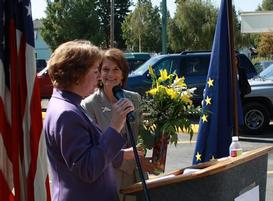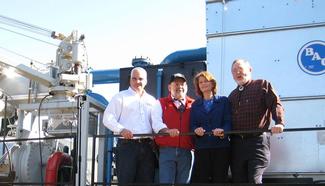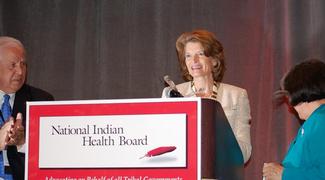Senator Murkowski - eNewsletter 09-21-09
Many Alaskan Voices, One Vital Issue

Sen. Murkowski, along with Joan Fisher, Executive Director of the Anchorage Neighborhood Health Center, announces that the ANHC will expand to better serve the Anchorage community.
This August, I focused on the issue that captured national and local headlines this summer -- Washington's efforts to reform the nation's health care system. I began a series of health care meetings in early August at the Alaska Native Health Board mega-meeting. My meetings also included Commonwealth North, the Anchorage Neighborhood Health Center and the Alaska Department of Health and Human Services. These important meetings helped lay the groundwork for my health care town halls I held across Alaska.
Sen. Murkowski addresses a capacity crowd at the Pioneer Park Theatre in Fairbanks.
During August, I was pleased to hold four town hall meetings on health care. Nearly three thousand Alaskans participated between Fairbanks, Anchorage, the Mat-Su Valley and the Kenai Peninsula. And just this week, I held a video town hall from Washington with residents in Kodiak. I was so impressed with the level of knowledge, the depth of beliefs, the widespread civility and the willingness of Alaskans to participate in these important forums.
As many of you know, I did not support the legislation that originated in the Senate Health, Education, Labor and Pensions Committee (HELP), of which I am a member. At the town hall meetings, I explained my concerns about how the HELP Committee legislation will cost $1 trillion over the next decade but do little to improve access to primary care doctors or reduce the skyrocketing growth in health care costs for Alaskans.
Following the town hall meeting on health care in Wasilla, Sen. Murkowski spoke with attendees.
Many who attended my town hall meetings also voiced concerns about a government takeover of health care and asked why we aren't fixing the problems with our federally run health programs, such as Medicare and the VA, before creating another government health plan. At the conclusion of my town hall meetings, many attendees filled out comment cards and I will be answering those questions and comments in the coming weeks.
Alaskans in Soldotna listen to Sen. Murkowski at her health care town hall.
From Washington, Sen. Murkowski conducts a video health care town hall with Alaskans in Kodiak.
If you were unable to attend my health care town hall meetings, please visit my website and click on the health care hot topic to see the slides that I discussed with town hall participants. Also, on my official YouTube page, you can find video of the Anchorage town hall that was covered by C-SPAN.
Summer Field Hearing Focuses on U.S. Arctic Policy

Sen. Murkowski discusses Arctic policy with hearing witnesses (from left) Admiral Thad Allen, Commandant of the United States Coast Guard and Alaska Governor Sean Parnell.
As a member of the Senate Appropriations Committee, I chaired a Homeland Security Subcommittee field hearing in Anchorage on the strategic importance of the Arctic and U.S. Arctic policy. Witnesses included Admiral Thad Allen, Commandant of the United States Coast Guard; Governor Sean Parnell; David Benton, of the Marine Conservation Alliance; Mead Treadwell, Chairman of the United States Arctic Research Commission; Dr. Lawson Brigham, from the University of Alaska Fairbanks; and Edward Itta, Mayor of the North Slope Borough.
The field hearing focused on the significant developments that are occurring due to a loss of summer sea ice in the Arctic. These environmental changes are making the region more accessible and increased maritime activity will demand new infrastructure and investment and a greater presence in the region.
Admiral Allen focused his testimony on the nation's icebreaking capability and the Coast Guard's role in both implementing the new National Arctic Policy and the new responsibilities in an ice-diminished Arctic present. Governor Parnell laid out the State of Alaska's view of U.S. Arctic Policy and the priorities they have identified. The other Alaskan panelists all spoke to their areas of expertise and perspectives on the changing Arctic and need for new investment, infrastructure and policies.
Energy Hearing Reveals Progress on Tapping Renewable Energy for Rural Alaska

While at Chena Hot Springs, Sen. Murkowski dedicated nation's first mobile geothermal turbine device. Pictured with Sen. Murkowski are, from left, John Fox, general manager of PureCycle Solutions, Bernie Karl, president of Chena Energy, and Rep. Don Young. The plant was built by Chena Energy and is powered with equipment from United Technologies.
The Senate Energy and Natural Resources Committee, of which I am the ranking Republican, held a field hearing at Chena Hot Springs this summer about how to bring lower-cost renewable energy technology to rural areas.
Our hearing was held in conjunction with the christening of the nation's first truly mobile geothermal electric generator being built and tested by Chena Energy and the annual renewable energy fair held at Chena Hot Springs. Our witnesses shared a number of exciting and innovative ideas with the committee. Steve Haagenson, director of the Alaska Energy Authority, discussed the state's plan to convert wind energy into hot water-storing the energy for electricity generation when the wind stops. Dennis Meiners of Intelligent Energy Systems also reported that his company is working to cut total fossil fuel usage in rural villages by 50 percent by installing stoves that can "store" renewable energy and use it for space heating. Gwen Holdman, director of the University of Alaska's Center for Energy and Power, reported that the university is working to better integrate hydropower, wind and diesel to reduce energy costs in rural areas.
The hearing also received testimony from a number of other witnesses on a wide array of issues including Doug Johnson of Ocean Renewable Power Co. on what steps are needed from the federal government to help ocean renewable energy blossom; Bernie Karl of Chena Hot Springs on the advances being made in geothermal power; Barbara Donatelli the vice president of CIRI on what the federal government can do to advance wind energy; Jim Dodson of the Fairbanks Economic Development Corp. on steps to advance biomass/coal energy projects in the state and Chris Rose of the Renewable Energy Alaska Project.
I am always impressed by the ingenuity of Alaskans and the good ideas they have already put into practice.
National Indian Health Board Recognizes Outstanding Alaskans Working in Alaska Native Health

Sen. Murkowski received the Jake White Crow award from the National Indian Health Board - its award of highest significance. The Jake White Crow Award is awarded annually to an individual whose lifetime of work and contributions help to advance American Indian and Alaska Native health.
Last week, the National Indian Health Board (NIHB) held its annual Consumer Conference here in Washington. During the conference, several Alaskans and Alaskan groups swept the awards ceremony in recognition of their work in Alaska Native health care. The NIHB awarded its National Impact Award to Dr. Kevin Gottlieb, D.D.S., of the Southcentral Foundation; H. Sally Smith of the Bristol Bay Health Corporation and Valerie Davidson of the Alaska Native tribal Health Consortium . The National Impact award recognizes individuals or organizations whose work has benefitted American Indian/Alaska Native health care on a national level.
Receiving NIHB's Area and Regional Impact Award was the Family Wellness Warriors Initiative of the Southcentral Foundation and the Alaska Federal Health Care Partnership Telehealth program. The Area and regional Impact Award pays tribute to an individual or organization whose work has contributed to improving American Indian/Alaska Native health care or affected change on a area or regional basis.
NIHB also awarded its Local Impact Award to Dr. Daniel O'Connell, M.D., of the Bristol Bay Area Health Corporation; the Alaska Native Medical Center nurses and the Alaska Native Medical Center Auxiliary. The local impact award acknowledges an individual or organization whose work has affected change on a local or tribal level.
The NIHB recognized Allison Simeon of the Yupik and Athabascan Tribes with its youth leadership award for her efforts to educate other teen girls to protect themselves from human papillomavirus (HPV). The Youth Leadership award commends a young American Indian or Alaska Native for their leadership and efforts to increase the quality of health care or health awareness among their peers and community at a local or national level.
I extend my hearty congratulations to these award winning Alaskans and Alaskan groups.
Summer Fun with Fellow Alaskans

Sen. Murkowski winds up a pitch.








